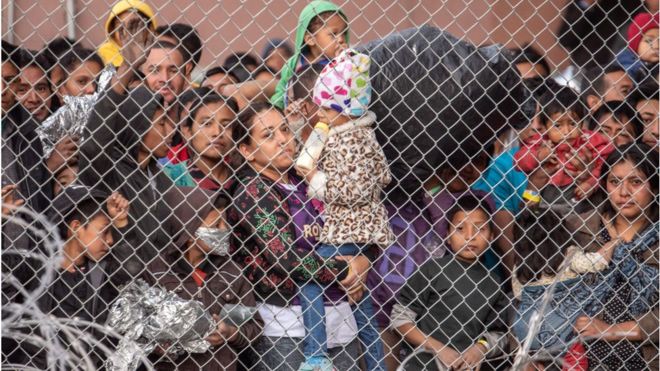By Glynn Wilson –
WASHINGTON, D.C. — Maryland Attorney General Brian E. Frosh announced Monday he is joining a coalition of 20 attorneys general in states across the country in filing a lawsuit opposing the Trump administration’s new proposed rule allowing the prolonged detention of immigrant children in federal custody along the border of Mexico and the United States.
In the complaint filed with the U.S. District Court for the Central District of California, the coalition of attorneys argue that the rule eliminates several critical protections guaranteed by the Flores Settlement Agreement, which has governed the treatment of children in immigration custody since 1997. The prolonged detention risked by the rule would cause irreparable harm to children, their families and the communities that accept them upon their release from federal custody.
“The Trump administration’s abuse of children is illegal and intolerable,” Frosh said in announcing that Maryland would join the court action. “The United States should not be taking children from their families, and it should not be holding children in prison-like conditions.
“Our law and our policy have, for decades, required humane treatment of children,” he added. “This new, terrible idea will not stand.”
The complaint, which seeks to stop the new rule from taking effect in October, argues that the administration of President Donald J. Trump’s proposed final rule interferes with the states’ ability to help ensure the health, safety and welfare of children by undermining state licensing requirements for facilities where children are held. The rule would also result in the vast expansion of family detention centers, which are not state-licensed facilities and historically have caused significant trauma and long-term negative health consequences in children.
The attorneys general argue the rule violates both the Administrative Procedure Act and the due process clause of the Fifth Amendment to the U.S. Constitution.
“This new Trump rule callously puts at risk the safety and well-being of children,” California Attorney General Xavier Becerra said in announcing the lawsuit. “It undermines a decades-old agreement reached in court by the federal government to prevent the unlawful detention of immigrant children.”
The Flores Settlement Agreement stems from a class action lawsuit filed before the U.S. District Court for the Central District of California in 1985 in response to substandard conditions of confinement for unaccompanied immigrant children. The lawsuit sought to establish standards for how the federal government should handle the detention of minors, including plaintiff Jenny Lisette Flores.
The plaintiffs expressed significant concerns about the use of strip searches, forcing children to share living quarters and bathrooms with adults of the opposite sex, and a prohibition on minors being released to non-guardian relatives, leading to prolonged and cruel detention of children.
Following litigation that moved through the U.S. Ninth Circuit Court of Appeals and the U.S. Supreme Court, the federal government eventually reached a settlement with class counsel in 1997 resulting, among other things, in a policy of releasing children “without unnecessary delay” to their parents, legal guardians, other adult relatives, another individual designated by the parents/guardians, or a licensed program willing to accept legal custody. It mandated that children be placed in the “least restrictive setting” appropriate to the minor’s age and special needs. And it established standards for safe and sanitary conditions of confinement for children in immigration detention.
Frosh joins in the lawsuit with the attorneys general of California, Massachusetts, Connecticut, Delaware, the District of Columbia, Illinois, Maine, Michigan, Minnesota, Nevada, New Jersey, New Mexico, New York, Oregon, Pennsylvania, Rhode Island, Vermont, Virginia and Washington.
Trump administration officials argue that the detention limits have become a “pull” factor for migrants, hoping that if they show up at the border with a child and ask for asylum, they will be allowed in — pending a hearing in immigration court. On Twitter and in speeches and comments, Trump has called this practice “catch-and-release,” an offensive, dehumanizing term when describing humans like fish being caught and thrown back in lakes and rivers.
Even if the courts allow the new rule to take effect, there are practical problems to enforcing it, like how to pay for detention facilities for thousands of additional families.
Acting Secretary of Homeland Security Kevin McAleenan said in announcing the rule last week that U.S. Immigration and Customs Enforcement has only three family detention facilities — two in Texas and one in Pennsylvania — that have between 2,500 and 3,000 beds. Yet more than 42,000 families, mostly from Central America, were arrested along the U.S. southern border just last month. The July arrest numbers are at record highs, even though they have dropped more than half compared with levels seen in May.
“Even if the number of border crossings doesn’t go back up in the fall, all this (new rule) would enable them to do is to detain a relatively small percentage of the arriving families for longer,” said Kevin Landy, a former ICE assistant director responsible for the Office of Detention Policy and Planning under the Obama administration, who said the practice will continue without more space.
But it’s up to Congress to decide how much ICE can spend on immigration detention, and the 2019 budget has only $2.8 billion earmarked to pay for 49,500 beds for lone adults and only 2,500 beds for parents and children. Yet spurred on by the president’s anti-immigrant campaign promises, the agency is already detaining more than 55,000 immigrants, a record high, but only a small percentage of them at facilities set up to handle families.














